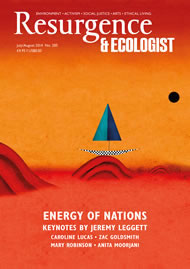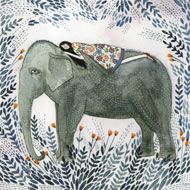The ‘bucket list’ is a staple of contemporary publishing. There are books about “the top 100 wines you must drink”, “the 100 cities you should visit” or “the 100 walks you should do”. Most bucket lists are simply “100 things to do before you die”. So prevalent is this activity now that there’s a master bucket list website where everyone can post a list.
What’s striking is how frequently these lists are to do with Nature. The places most often chosen are those regarded as having extreme natural beauty: the Great Barrier Reef, the Amazon rainforest, the Galapagos Islands, Arizona’s Grand Canyon, Yellowstone National Park, the Giant’s Causeway. The ‘sights’ also invariably include amazing natural phenomena: the Northern Lights, a meteor shower, a full moon (preferably during a full-moon party in Thailand), a total eclipse, an active volcano. Many experiences involve exposing yourself to the power of Nature, such as white water rafting, “floating in the Dead Sea” or “showering under a waterfall”. Some express a desire for close encounters with other species: swimming with dolphins, whale watching, riding an elephant, going on a safari, seeing the mountain gorillas, or, more dubiously, “hugging a koala bear” or “cuddling a tiger cub”.
Behind all these is a desire not just to witness the glory of Nature but also to be stunned or amazed by it. The locations that feature are pristine places, Nature as we imagine it untouched by human hand, awe-inspiring and stunning. The experiences are similarly about being awed, whether by the sheer force of Nature hurtling down a waterfall, or by feelings of reverence at close proximity to wild non-human species. What they all seem to express is a belief that these natural sights and experiences are meaningful; something that might define your life as having been in some way worth living.
Of course the lists include human-made wonders: Stonehenge, the Taj Mahal, the Pyramids, Venice, the Great Wall of China, Machu Picchu. But these have something in common. They are strikingly harmonious with Nature. What never appears on these lists is a desire to see something where Nature has been subdued, dominated and eliminated. How often do these lists include a shopping centre, a housing estate of high-rise buildings, a tangle of motorway junctions, or a heap of abandoned and rusting cars? No one, it appears, wants to fill their remaining days with things that we regard as ugly, by which we appear to mean places where humans have obliterated the natural environment that once existed there, overwhelming it with transient, ugly buildings.
These lists tell us Nature is still much more important than we might imagine in this urbanised world. They tell us that our encounters with Nature give meaning to our existence. Perhaps this should restore our faith that people have got the right priorities in spite of all the devastation inflicted on the environment. And in some ways it is heartening because, in spite of the low priorities politicians and business put on Nature, here is evidence that so many people still love Nature considering her a source of meaning and inspiration.
But these lists are also disheartening because they embody a consumerist attitude to life. Nature becomes a ‘must-have’ experience, sights to tick off, or services to indulge an individual. Paradoxically, given the value individuals clearly put on her, Nature is promoted as a set of experiences rather than something precious to be protected. Yet so many of the listed experiences are about Nature under threat: gorillas are endangered, glaciers are melting, the rainforest is disappearing before our eyes. Even the most treasured human sites are threatened, like the ugly urbanisation encroaching on the Pyramids.
With such threats, by far the most important activity before you die might be to try to save these awe-inspiring places and species forever. Some environmental groups try to articulate this. “For wildlife lovers, goals may include seeing a red squirrel in the wild, or experiencing the unforgettable sights and sounds of a starling murmuration,” says Kent Wildlife Trust. The Trust also suggests that by adding a donation to your list, “your bucket list could go one step further. It could be the start of something amazing. It could change your life and the lives of others.”
It would be better still if the meaning of Nature for individuals were properly recognised by those with the power to shape our lives.








